As business leaders and HR folks, you have an important task: caring for your employees. It’s also one of the most difficult jobs you have—and it doesn’t matter if you’re a small-business owner or in corporate America. That’s because it’s tough to know what your employees need, and even if you do, finding the right benefits to offer can be a crapshoot.
A comprehensive employee benefits package is an important part of taking care of your employees and staying competitive as you recruit new hires. But the fact is, most benefits packages come up short in at least one critical area—employee financial wellness.
Employee Money Stress Is Hurting Businesses Everywhere
Employees have been struggling with their money for a long time. It’s not new. Most live their lives paycheck to paycheck, scraping the bottom of the barrel to get by even if they make good money. But that’s only half the story. Employees don’t leave their money stress at home. It follows them into work and steals from your company’s bottom line in the form of turnover, lost productivity, absenteeism and delayed retirements. And those bottom-line killers can cost the company thousands of dollars each year—millions for enterprise-size businesses.
With the bottom line in mind, it makes sense that business leaders would ask how to fit financial wellness into their employee benefits packages. But first, you have to back up and start with a high-level view of benefits and their impact on the health of the business.
To do that, we talked to more than 1,000 benefits decision-makers in companies of all sizes across the United States. We wanted to learn more about how they build their employee benefits packages and measure the impact on their organization. This is what we found.
A High-Level Overview of Benefits
Top Factors in Choosing Benefits
Employers put a lot of thought into choosing which benefits to offer. They think about things like . . .
1. Cost of benefit to the employee
2. Value brought to employees from the benefit
3. Cost of benefit to employer
4. Percentage of employees that will use the benefit
5. Ease of implementation
Top Indicator of a Successful Benefits
Obviously, the benefits employers offer need to work. But how do they know they’re working? Our research found that while the value employees get from a benefit is the second-most important factor for employers, it’s also the number one indicator of that benefit’s success. That makes perfect sense because employers want the benefits they offer to actually help their employees.
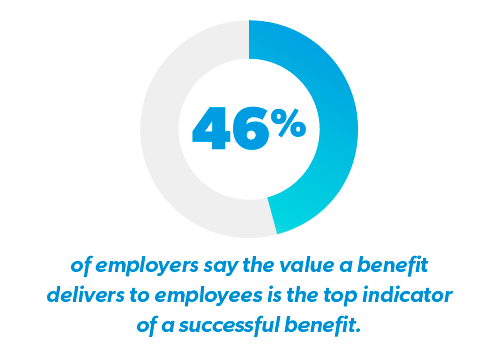
Benefits Satisfaction
Even though employers put a lot of thought into the benefits they offer, satisfaction isn’t guaranteed. In fact, most say there’s room for improvement when it comes to their current benefits packages. But get this: Companies who offer financial wellness benefits are more likely to be extremely satisfied with their benefits packages overall (51% compared to 36%). The numbers don’t lie!
Extremely Satisfied with Benefits Package

The Benefits Landscape
To get an overview of the benefits landscape, we asked decision-makers which benefits they currently offer their employees. It’s no surprise that the usual suspects like health insurance, paid time off and retirement savings plans topped the list with mental health benefits rounding out the top 10. What’s missing? Financial wellness. Only 3 out of 10 currently offer a financial wellness benefit.
The Top 10 Benefits Currently Offered:
- Health insurance
- Paid time off
- Retirement savings plans
- Life insurance
- Dental insurance
- Vision insurance
- Health and wellness programs
- Disability insurance
- Employee assistance programs
- Mental health/emotional well-being services
The Top 5 Benefits Employers Are Considering
Even though financial wellness doesn’t make the top 10 list of benefits employers offer today, it’s about to make the list! Our research found that of employers who don’t already offer financial wellness, it’s the number one benefit they’re looking to add in the next one to two years.
Click here for free, SHRM-accredited webinar content on all things HR and business leadership.
The Top 5 Benefits Considered:
- Financial wellness benefit
- Student loan repayment assistance
- Professional development
- Diversity training and initiatives
- Mental health/emotional wellbeing services
The Impact of Financial Wellness on Organizational Health
Awareness of Employee Financial Health
Like we mentioned earlier, your employees’ financial well-being affects your business whether you know it or not. So we asked the decision-makers how aware they are of the financial stress their employees are dealing with. Overall, only 28% of employers say they have a great deal of awareness about their employees’ financial health. That’s not great. But that number jumps up when a company offers financial wellness—employers are twice as likely to say they have a great deal of awareness once they start offering this kind of benefit.
Great Deal of Awareness of Employee Financial Health
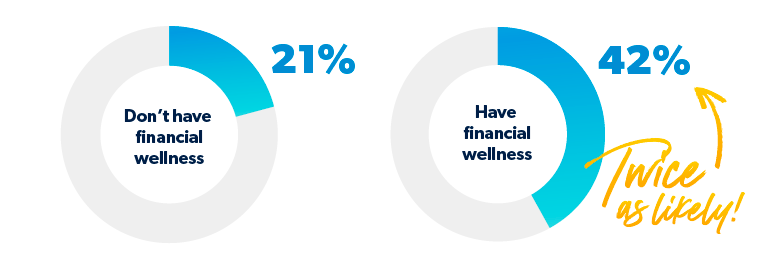
Responsibility for Employee Financial Health
But it’s not enough for employers to simply be aware of their employees’ money issues. Why? Because awareness doesn’t do anything to help. Employers need to be aware and feel responsible for their employees’ financial well-being to be able to help their employees win with money.
But here’s the kicker: Our research showed that, overall, only 18% of employers feel an extreme sense of responsibility for their employees’ financial health. But the amazing thing is, employers who offer financial wellness as a benefit are twice as likely to feel extremely responsible for their employees’ financial well-being. Imagine that!
Feel Extreme Responsibility for Employee Financial Health
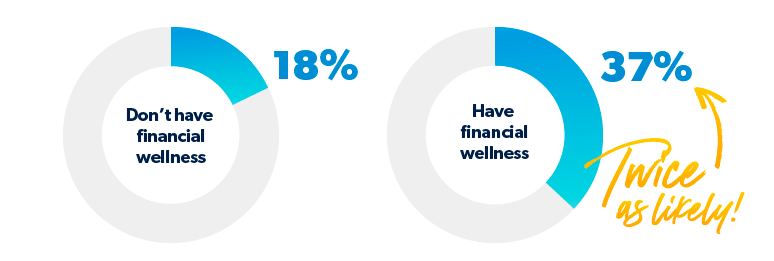
Impact of Employee Financial Stress
While many employers may not have a deep understanding of their employees’ money problems or feel super responsible for helping them solve those problems, nearly one-third say they know the level of financial stress their employees experience is too high. And almost half say stress has a significant impact on their employees.
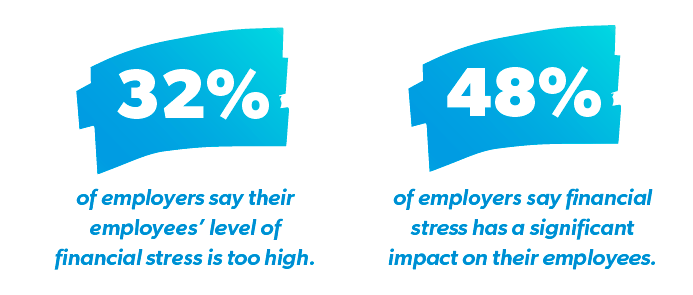
Which Employees Are Struggling?
This reality may be a tough pill to swallow: Financial stress affects all types of workers. They could be making $15 an hour or six figures—it doesn’t matter. Bad money habits, like taking on debt and living above your means, aren’t limited to certain pay grades. There really isn’t an industry, type of work or compensation level that is immune to employee financial stress. It’s a problem for all companies whether they know it or not.
Types of Workers Significantly Impacted by Financial Stress
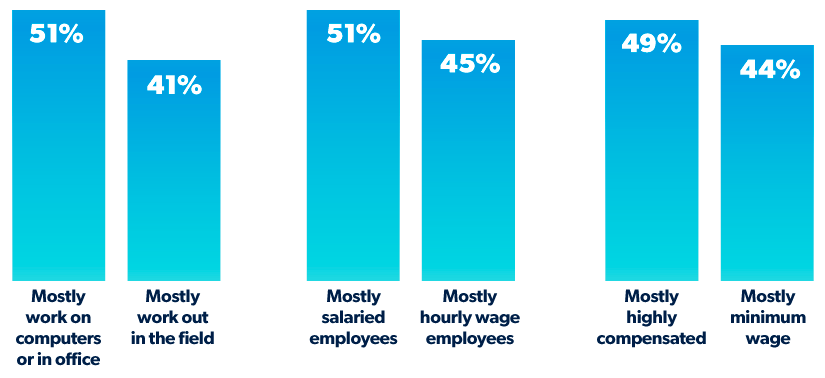
The Perceived Impact of Employee Financial Stress on Business
To make matters worse, these business leaders say they’re feeling the effects of employees’ financial issues on their bottom line. Many said they had significant concerns about high/increasing health care costs for employees, high employee turnover, low productivity and distracted workers—all symptoms of a team dealing with big money problems. Another costly consequence of employee financial stress? Delayed retirements. Employees who can't retire on time because of financial stress cost the company tens of thousands of dollars each, especially if they’re senior-level people holding back their coworkers’ advancement.
The Impact of Employee Financial Stress on Businesses
- High/increasing health care cost for employees
- Employees delaying retirement for financial reasons
- High turnover of employees
- Low productivity from employees
- Distracted employees
- Low participation in company-sponsored retirement savings
Delayed Retirement Is a Bottom-Line Killer
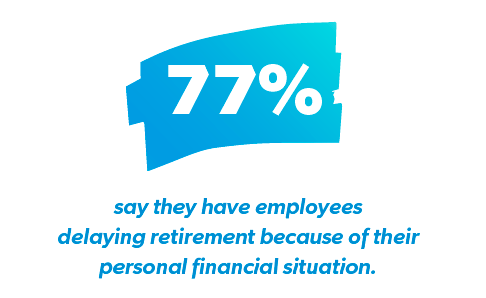
There’s No Better Time for Financial Wellness Than Now
So, what’s the bottom line? Employee money problems are also your company’s problems. The solution? Financial wellness benefits. They aren’t just a trendy thing that only certain kinds of companies offer. In fact, financial wellness is essential, especially for companies that want to help their employees and their company’s bottom line at the same time.
Want to learn more about how financial wellness? Check out The 2021 SmartDollar Financial Wellness Benefits Study!



